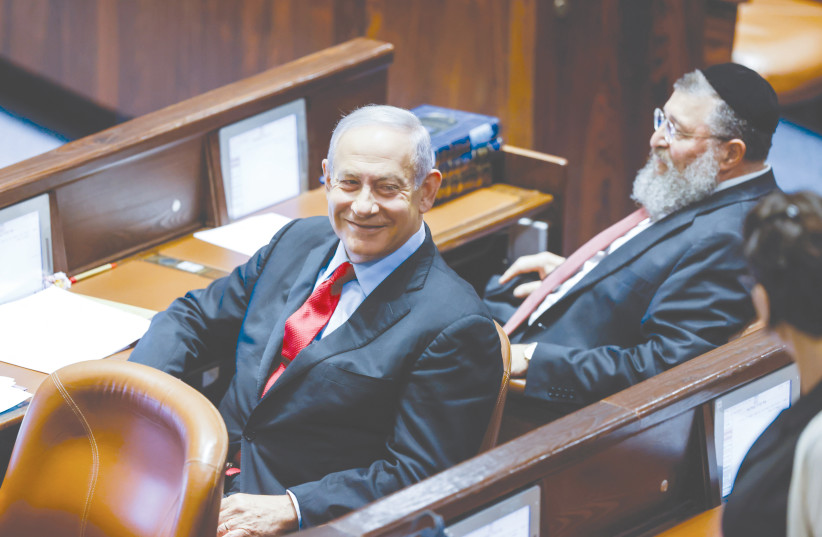The 24th Knesset voted 92-0 on Thursday morning to disband itself and to hold the next election on November 1. It will be the fifth Knesset election in the past three and a half years.
Consistent with the coalition agreement signed last June, Yesh Atid head Yair Lapid is now prime minister.
The Knesset plenum rejected the proposal submitted by the opposition factions, according to which the election would have been on October 25. The haredi Orthodox parties and Religious Zionism preferred this date since it fell during the yeshiva fall holiday recess, allowing their electorate to mobilize on Election Day.
Both Labor and Yisrael Beytenu left the plenum and did not vote, in protest of the opposition’s refusal to pass the Metro Law, which sets a framework for expanding the Tel Aviv Light Rail network into a full subway system.
A number of MKs spoke in the debate leading up to the vote. Blue and White MK Eitan Ginzburg said that his party did not want to dissolve the Knesset.
"I believe we gave up too soon. Elections for the fifth time in four years are not a healthy thing for the country. We in the Knesset have created something special that had not seemed possible in the past."
Blue and White MK Eitan Ginzburg
Who voted and who didn't?
“I believe we gave up too soon,” said Ginzburg. “An election for the fifth time in four years is not a healthy thing for the country. We in the Knesset have created something special that had not seemed possible in the past.”
Labor head Merav Michaeli said that the Knesset’s dissolution today shouldn’t have happened. “The Knesset and the government are good for the State of Israel, and should have continued to work, but there are those who could not withstand the pressure,” she said. “This dispersal was born in sin and continued in the sin of not passing the Metro Law because of personal and petty politics.”
A small ceremony to replace Bennett with Lapid as prime minister was held during the afternoon in the Prime Minister’s Office without guests or media.
Minutes after Ginzburg’s statements, opposition leader Benjamin Netanyahu said that “this is what happens when you mix together a fake right-wing party and extreme leftist parties, mixed with the Joint List. That’s what you get. That’s exactly what the upcoming election is about. Will there again be a failed Lapid government here, dependent on the Muslim Brotherhood in common with supporters of terrorism, or a broad and strong national government headed by us that will return pride, power and hope to Israel? Lapid can only form a government with the Muslim Brotherhood and the Joint List.”
"This dispersal was born in sin and continued in the sin of not passing the Metro Law because of personal and petty politics."
Labor head Merav Michaeli
Calling the coalition a “failed experiment,” Netanyahu said that “we are the only alternative. When we win the next election, our first mission will be to lower prices and restore economic stability and growth for all Israeli citizens – Jews, Arabs, Bedouins, religious, secular and haredim.”
Slamming Lapid, Netanyahu called him the “most failed finance minister in the country’s history,” referring to his term as finance minister under Netanyahu from 2013 to 2014, and that “in contrast, we know how to lower inflation,” a reference to when he served as finance minister from 2003 to 2005.
Ra’am head Mansour Abbas took issue with Netanyahu calling him a terror supporter, and accused the opposition head of being the first one to negotiate with Ra’am for its support and for joining forces with the Joint List in bringing down the government.
Knesset Speaker Mickey Levy spoke immediately after the vote.
“I sincerely hope that we will learn from the mistakes of the 24th Knesset,” he said. “We must not continue in a way that could dismantle the Knesset and our ability to lead the country and set an example for debating contentious issues.”
The plenum then approved the remaining bills that the coalition and opposition had agreed upon. One was the Omicron Law, which provides compensation for businesses that suffered significant losses during the corona wave between January and February.
The Metro Law and US visa laws were left out.
Netanyahu did not waste time and began his campaign immediately. The former prime minister visited Jerusalem’s Malha Mall on Thursday afternoon, entering a supermarket and promising to bring down the high cost of living.
Netanyahu also scored a political victory on Thursday when MK Yuli Edelstein announced that he would not run against Netanyahu for the head of the party, after announcing in October that he was planning to do so.

